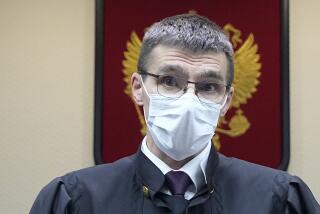Soviet Citizens Can Now Sue Government : The Law: Up until now, people with complaints could only sue individual officials, not the bureaucracies.
- Share via
MOSCOW — Soviet citizens won the right Thursday, for the first time, to sue government agencies to seek redress of their grievances.
The Supreme Soviet, the national legislature, enacted the law as part of a sweeping reform of the Soviet legal system. The law will permit people to bring complaints against state organizations into independent courts for a hearing and judgment.
Artem M. Yakovlev, a member of the Supreme Soviet’s Legal Affairs Committee, described it as one of the most important and practical measures to protect individual rights and to transform the country into a society governed by law rather than bureaucratic regulation.
Until now, people with complaints against the government could only sue individual officials, charging them with violating regulations, bias or wrongdoing.
The powerful, faceless bureaucracies that control so many aspects of Soviet life could not, even under a law adopted in 1987, be taken to court to answer for their decisions or actions. Many complaints were turned over for investigation and resolution to the very agencies that brought on the complaints.
In the Soviet legal system, the classic European concept of “sovereign immunity” under which the state could not be sued was reinforced by such socialist principles as the “dictatorship of the proletariat.” This made all government decisions unchallengeable except within the country’s political forums, where the bureaucracy has a strong voice.
As a result, Soviet citizens have been able to turn only to legislative bodies, such as the Supreme Soviet, for review of their complaints, and these are now recognized as incapable of investigating and assessing the thousands of grievances brought to them.
The main grievance--unlawful dismissal by a state-owned enterprise--could not be heard unless a worker could argue that an enterprise official fired him out of malice or in violation of law. Most cases simply never got to court because the official could not be identified or his wrongdoing proved.
With other legislation under consideration to broaden civil rights here, Yakovlev told his colleagues that the courts had to be authorized to review complaints of infringement. Among the pending legislation is a bill ensuring “freedom of conscience,” particularly religious belief, another establishing press freedom and still others protecting the rights of free speech, political assembly and association.
Several deputies called for the effective date of the new law to be brought forward to Dec. 1 from next July, but Yakovlev told them the courts need time to prepare for the expected flood of cases, especially those certain to be brought by dismissed workers.
In other action, the Supreme Soviet gave preliminary approval to a law that will increase state pensions to the retired, who number nearly 60 million, a fifth of the population, by an average of 40%.
Premier Nikolai I. Ryzhkov said the equivalent of $46 billion a year at official exchange rates will be needed to pay the higher pensions. But he described the move as essential to lift the elderly and disabled out of their deepening poverty.
More to Read
Sign up for Essential California
The most important California stories and recommendations in your inbox every morning.
You may occasionally receive promotional content from the Los Angeles Times.












